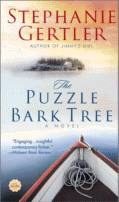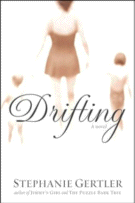Writing the Novel
by Stephanie GertlerWriting is deeply personal for me. I would imagine many art forms hold this characteristic -- painting, sculpture, photography, theatrical roles. The art form, although if we're fortunate enough to have some acclaim will ultimately become public, emanates from our hearts and reflects ourselves. And, hopefully, our art will touch others where our own self-expression assumes a universality. For me, writing is an opportunity and a vehicle with which I can bare my soul without inhibition, share secrets, fears, dreams and find resolution.

|
In other words, writing fiction is the glorious marriage of realism and fantasy, allowing the writer to spin what did happen into what could have happened -- or what we wish could have happened -- or what we are capable of making happen. A good story is an intricate embroidery where details of living are woven together and the finished product is one of resolution at best and, at the very least, an understanding and acceptance of oneself. Telling a story places layer upon layer and, ironically, as I weave the tale, there is also an unraveling as I come to see the perplexities and complexities of my own life. The best part is placing the embroidery into the hands of my characters who ultimately do a better job than I could have done myself in telling the story.
I never understood what writers meant when they said that their characters were truly the writers of their stories. It wasn't something I espoused until I wrote Jimmy's Girl, my first novel, and suddenly about one-third of the way into the book I saw that Jim and Emily, although created by me, became narrators apart from myself. And as I continue to write, the characters become people I know more and more. By the time I type the last line, I have a feeling of sadness because, as silly as it may sound, I will miss these people. They've become old friends.
Then there is the setting. Setting is as important to me as the characters. In real life, I need the infinity of water! A lake, the sea, a river. In real life, I dread being landlocked; in my novels, the feeling is the same. And, again, once the book is finished, I miss the place. I long to go back there. But then again, I know another book will take me somewhere else, again near the water, where I have that sense of peace and home and continuity. In Jimmy's Girl, the beach played an enormous role in Emily's past as well as her present. In my second novel, The Puzzle Bark Tree, the fictional setting of Sabbath Landing and Diamond Lake, was based on a real place in the Adirondacks, an area I have come to love in all seasons.

|
In Drifting, I have combined two themes that permeate my soul: the notion that the most powerful love on earth exists between mother and child, and what happens to a child when a mother's love is absent. Unquestionably, love and loss play an enormous role in my novels. Well, love and loss play an enormous in my life and all of our lives. In Drifting, the protagonist Claire, faces her demons, both real and imagined, and becomes fearlessly whole as she confronts the truth.
The other question people always ask is who are my favorite authors. First, let me say that I have no favorite authors as much as I have favorite books. Depending upon "where I am" in my life, my choices change. For example, I loved A Tree Grows in Brooklyn when I was fourteen and it will stay in my memory (to the point that every time I shave under my arms I picture Francie in that scene where she shaves under her arm for the first time) but I don't know that I could read it again with the same fervor. I loved Little Women, Gone With the Wind, A Little Princess, The All-of-a-Kind Family series, Catcher in the Rye, The Diary of Anne Frank, The Heart is a Lonely Hunter, To Kill a Mockingbird, The Great Gatsby, From Here to Eternity. Those were the favorites from my childhood through my college years. In the last decade I have loved Jodi Picoult's Harvesting the Heart, The Pact, and Keeping Faith; Anita Shreve's The Weight of Water and Eden Close; Sue Monk Kidd's The Secret Life of Bees; Ken Haruf's Plainsong; A. Manette Ansay's Vinegar Hill; Billie Letts's Where the Heart Is; Wally Lamb's I Know This Much is True; Nicholas Sparks' The Note book; Robert Waller's The Bridges of Madison County; Evan S. Connell's Mrs. Bridge; Alice McDermott's That Night; Sue Miller's While I Was Gone; Anna Quindlen's One True Thing. Eclectic enough? I'm sure I've left some out.... And it goes without saying, a writer can't write if a writer doesn't read.
And then there's music (and my tastes are eclectic here as well). Music plays a tremendous role when I write. I love opera, country music, pop, folk, jazz and Baroque. The only music I really don't like is hard rock! My CD player will hold Andrea Bocelli, Norah Jones, Martina McBride, Vivaldi, La Boheme, Barry Manilow, Johnny Mathis, Don Henley and Aztec Two-Step all at the same time! But when I write, I always listen to piano music. I love the purity and simplicity of the instrument and the songs (mostly from shows and movies) conjure up images for me that soothe me and take me away.
I'm currently working on my fourth novel. It is one of secrets in a marriage begging the question: what secrets can we keep in a marriage and which should we confess? Again there is theme of the resilience of the human spirit: this time a resilience that allows my female protagonist to find herself again and fall in love at fifty. But at fifty, she knows the pitfalls of youth, has familiarized herself with the detours and has the ability to face life with a courage and knowledge that empowers her and allows her to reinvent herself -- once again as she is willing to embrace the truth. In short, unraveling the embroidery that makes up ourselves and our lives, facing our demons and re-weaving our spirits and souls makes for great stories that bring us together in a world that I believe should hinge on two things: truth and love.
©2003 by Stephanie Gertler. All rights reserved.
Stephanie Gertler, who has been writing all her life, writes a monthly lifestyle column, "These Days," for two Connecticut newspapers, The Advocate and Greenwich Time. She lives with her husband, three children, and five dogs in New York.


